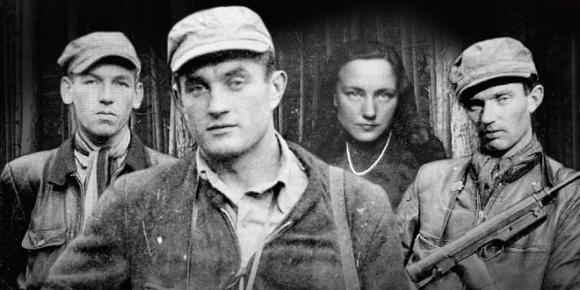The story of Lithuanian partisans told sensitively and patriotically in the film "The Invisible Front"

Title of the most watched Lithuanian film at Vilnius International Film festival “Kino pavasaris” went to the documentary "The Invisible Front" by Lithuanian American Vincas Sruoginis who has many years of experience working in film, television and advertising, and Swedish filmmaker, journalist John Ohman who is living in Lithuania and making documentaries. The film tells the story of the partisan struggle in Lithuania in 1944-1953. “The Invisible Front” was a coded name used by the Soviet Interior forces to describe the resistance movement in Lithuania.
The film is presented in television journalism style by the canons of explanatory documentary – narrator tells the story in English, because, as the authors of the film have emphasised, the film is intended for international audiences. The story is intertwined with testimonies of witnesses of the events, contemporaries and historians; President Valdas Adamkus also presents his comments. In addition, interviews shot by the filmmakers, excerpts from other films or journalist interviews are used in the film. All of that is overlaid with photographs, archival footage, reconstructions, modern urban or rural views used through associations. In the film, representatives of 'both sides' are interviewed – partisans, people who have helped them, and those who worked for the Soviets (though, of course, supportive for Lithuanians stance is maintained). It is a success that the filmmakers managed to make the 'other side' talk, and its existence is not ignored. It is a proof that finally there's no fear to openly reflect on history. Perhaps this is because the film creators are not born in Lithuania, they manage to keep the distance while talking on this subject, which is painful to Lithuanians.
"The Invisible Front" opens with archival images from the events of January 13th, then we are transferred back to the Second World War period; the historical background is described rapidly, clearly and concisely; facts about deportations of Lithuanians are revealed. Gradually starts a conversation about the partisan struggle. One after another, the tragic stories of different players of the resistance - Jonas Žemaitis' liaison Eleanora Rubine, partisan Jonas Kadžionis, Vincas Bilskis who helped the resistance movement - are revealed. The authors try to understand why these people even being aware of the futility of the fighting, still went to fight. This is done in a sensitive way, revealing and highlighting patriotism of the Lithuanian nation.
Major focus of the film (almost half of the time) is on Juozas Lukša-Daumantas and the love story between him and Nijolė Bražėnaitė. According to the creators, the story of Lukša was chosen because it has become a symbol of the Lithuanian partisan struggle. Here the excerpts from the books "Partisans", "Letters to the Beloved" by J. Lukša are quoted, as well as stories of his contemporaries are cited, also Nijolė Bražėnaitė herself talks. In the archival interviews that were not much seen before, the members of the resistance speak: Jonas Pajaujis, who was operating in Paris with Lukša, and even Jonas Kukauskas, who later on betrayed Lukša.
Director Vytautas Landsbergis also took interest in this legendary love story in his film "Partisan's Wife" (and more in J. Lukša himself - in the film "The Ballad of Daumantas"), but he did it in more artistic documentary form and in a far more forceful way – the film story was mostly based on voiced-over text of the letters between Juozas and Nijolė, and interviews with Nijolė, while the visuals were presented using archival images and reconstruction as well.
It is worth mentioning that the mood of "The Invisible Front" is shaped by minor melodies by Icelandic composer Ólafur Arnalds (Lithuanian music lovers must have heard him when he was on tour with the Icelandic post rock band Sigur Rós).
"The Invisible Front" is not especially exciting in its form, but is created very professionally. Narration manner is rather chilly, but the film is gripping, not boring at all. Just maybe occasionally the over-illustrative depiction of Lithuania is noticeable, when people are interviewed with Lithuanian national ornamental bands in the background or sitting in a rye field.
Lithuanians who are deeply interested in history will not find a lot of new facts, because "The Invisible Front", as mentioned before, is intended for the foreign audience. But the film is far from superficial – the partisan struggles are summarized in a relatively short period of time (approximately one and a half hours), and at the same time the film delves into the stories of particular personalities. It is an informative film – it is valuable as an educational medium, and for Lithuanians it will be important and pleasing to see a strong, inspirational story about the struggles for freedom, to remember the people involved in them.